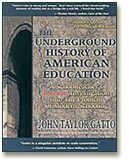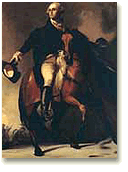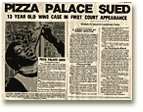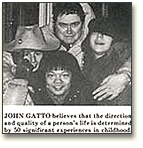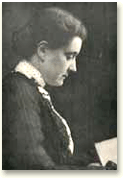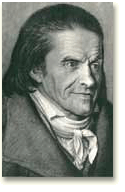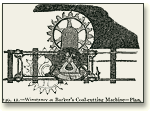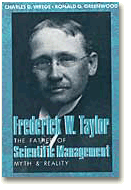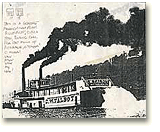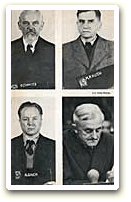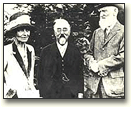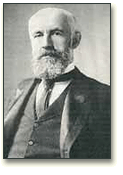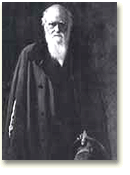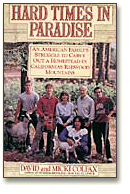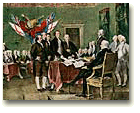Congressional Issues 2010
|
|
Congress should:
Christian Literacy and Secularist Ignorance
|
|||||||||||||||||||||||||||||||||||||||||||||||||||||||||||||
|
Horace Mann did not disagree with this. Horace Mann wanted schools that taught religion. There is no constitutional requirement to remove religion from any government-sponsored activity -- especially education, which is inherently religious.
The following dialogue originally appeared on American OnLine's "Separation of Church and State" Discussion Board. "Ed" says he used to work in the federal Dept. of Education.
The dominance of the New England Primer in the 1700's and the McGuffey Readers in the 1800's, shows that Education was Christian and Biblical throughout this period. The Constitution and the First Amendment were never understood to prohibit state and local governments from encouraging the teaching of religion in all schools.
But the point is inescapable. The Bible was taught in public schools long after the Constitution was ratified. Even while Horace Mann was active, the New England Primer was still being used:
That Cotton Mather's injunctions were not simply the ravings of a [fanatic] minister is attested by the whole content and spirit of the New England Primer which was the most widely read school book in America for 100 years. The best estimate is made that some 3,000,000 copies were sold from 1700 to 1850.
Butts & Cremin, A History of Education in American Culture, Holt, Rinehart & Winston, 1953, p.69
No one believed this to be unconstitutional (except a few wiggy and blasphemous prototypes of the ACLU, who were always ruled against in court).
Subject: Re: Wall of Separation
From: KEVIN4VFT
To:
Separation of Church & State
Date: 6/12/00
In article <20000612003108.11557.00000920@ng-cc1.aol.com>, edarr1776@aol.com
(EDarr1776) writes:
>We had no mandatory education for the first 150 years of the republic, or so.
>We found that illiteracy
prevailed, that education was not so deeply spread
>as we need to be successful economically.
>
>It's mandatory because mandatory education produces huge
benefits for the
>nation.
Let's see, if we date the beginning of the Republic at 1776, that would mean no mandatory education until 1926? But Justices Frankfurter, Burton, Jackson and Rutledge noted in the McCollum case that the first compulsory common school legislation was in 1648. And Ghostwriterfax's article said the Northwest Ordinance (1787) was intended to make education compulsory.
Perhaps the reason secularists are so confused is that they are confusing compulsory education with compulsory SECULAR education paid for by the state. Compulsory education does not have to mean state financed education. It is possible to have a law requiring everyone to attend a religious private school.
Which is basically what we had for the first 200 years of American history, with state financing gradually appearing and becoming entrenched in the 1800's. Then the clergy of rival denominations got upset because the state was funding the other guys sectarianism. The answer is getting rid of all state funding.
And the rise of compulsory government education wasn't due to great illiteracy, either. John Taylor Gatto, New York State Public School Teacher of the Year, author of Dumbing us Down, The Exhausted School, and The Empty Child has noted:
[I]n 1818, 34 years before the first compulsory [state] school laws, Noah Webster estimated that over five million copies of his Spelling Book had been sold in a country of under twenty million population. And when you consider that every purchase decision had to be made freely by an individual or a family and that there were no federal, state or city tabs on which to run bulk purchases, it would seem to suggest that most people don't have to be tricked or compelled to learn; most people in a natural setting will do it on their own because they want to. Each Spelling Book purchase decision was made privately. In each case someone forked over some cash to buy a book. According to the American Library Association, only one adult American in every 11 does that any more; so you can see we must have been radically literate by modern standards in those by-gone days.
Between 1813 and 1823, Walter Scott sold five million copies of his novels in the U.S., equal to about 60 million books today; James Fenimore Cooper's books (think of Last of the Mohicans) also sold in the millions. Pick up a Cooper or a Scott at your local library, and you will discover both authors write complex, highly allusive prose, not easy reading even by a college student today.
In 1812 Pierre DuPont de Nemous published Education in the United States, a book in which he expressed his amazement at the phenomenal literacy he saw. Forty years before passage of our first compulsory [state] school laws, DuPont said that fewer than four out of every thousand people in the new nation could not read and do numbers well. Looking around himself and comparing America with the Continental traditions he had left behind, he saw a world in which nearly every child was skilled in argumentation (the old-fashioned term for "critical thinking") because of the widespread habit of involving young children in disputes about the meaning of ambiguous Bible passages, or so that seemed the explanation to Mr. DuPont. [Gatto is not a Christian].
John Adams discovered in 1765 that a "native of America, especially of New England, who cannot read and write is as rare a Phenomenon as a Comet." Daniel Webster said that "a youth of fifteen, of either sex, who cannot read and write, is very seldom to be found."
Education historian Lawrence A. Cremin, who has written several books about American education, has concluded that literacy rates among American whites were as high or higher than in provincial England, and significantly above those in Ireland. At a time when estimates of adult male literacy in England ran from 48 percent in the rural western midlands to 74 percent in the towns . . . adult male literacy in the American colonies seems to have run from 70 percent to virtually 100 percent . . . .
(See Traditions of American Education, NY: Basic Books, 1977, and American Education: The Colonial Experience, NY: Harper & Row, 1970.)
Kennedy & Newcombe
What If Jesus Had Never Been Born?
Thomas Nelson, 1994, p. 49
And more important to a good Republic, as the Founders all agreed, these kids had good manners and law-abiding character.
I don't see this today. Maybe I'm laboring under the lies of the Reagan Administration Education Report which opened by stating that if a foreign power had imposed our present education system and results on us, we would view it as an act of war. I understand that nearly HALF of ALL highschool graduates leave school functionally illiterate.
The Founding Fathers were right, as DeTocqueville noted: "Religion is the road to knowledge." Take out religion and morality from schools and you also take out knowledge.
Subject: Compulsory schooling vs. Compulsory education
From: KEVIN4VFT@aol.com
To: Separation of Church & State
Date:
6/20/00
In article <20000618152110.12114.00000746@ng-ff1.aol.com>, edarr1776@aol.com (EDarr1776) writes:
>I
wrote in an earlier post: >We had no mandatory education for the first 150
>years of the republic, or so.
>>We found that illiteracy prevailed, that
education was not so deeply spread
>>as we need to be successful economically.
>
>>It's mandatory because mandatory education produces huge
benefits for the
>>nation.
>
>Kevin said: >>Let's see, if we date the beginning of the Republic at 1776,
>that
>would
mean no mandatory education until 1926? But Justices
>Frankfurter, Burton, Jackson and Rutledge noted in the McCollum
>case that the first compulsory common
school legislation was
>in 1648. <<
>
>So how many kids were covered by that 1648 legislation? 10? 15?
The law specifically applies to every community with more than 50.
>The fact is that compulsory education laws by states were not passed
until
>after the 1890s.
Is that a typo?!?
>While Massachusetts had a law
requiring schools, attendance
>was no compulsory and was in any case, very rare. Schooling of any sort was
>uncommon until the 19th century and the rise
of the public schools.
>Schooling past 8th grade was extremely rare until the 20th century and the
>rise of compulsory education. Compulsory education was
not the law in the
>majority of the states until the 20th century, and graduation from high
>school not a majority circumstance until after Wordl War II.
>
>Kevin,
if you get the history right, you have half the battle. I urge you to
>get some normal history books about education.
"Normal" is of course defined as any book which agrees with Ed's secular mythology. The latest highly-praised book by John Taylor Gatto would certainly not be considered "normal" by Ed. Click here for details.
>>>And Ghostwriterfax's
article said the Northwest Ordinance
>(1787) was intended to make education compulsory.<<
>
>So on this one point now
you accept Ghostwrtrfx2's word as solid, while you
>reject everything else the man writes? That's quite disingenuous, isn't it?
Why would it be? I reject most of what Justice Douglas says, except when he admits that the Establishment Clause never covered prayer in schools, and when he admits that the Northwest Ordinance perpetuated the teaching of religion in public schools. Even a broken clock is correct twice a day.
>Did he write
that? There is not a shred of evidence to support that the
>Congress intended to make education compulsory. At the time they passed
>Jefferson's law
on land disposal, they rejected wholesale his education
>suggestions.
I'll be quoting that paragraph next time Ed asserts Jefferson's role in public education.
>>>Perhaps the reason secularists are so confused is
that they are
>confusing compulsory education with compulsory SECULAR education
>paid for by the state. Compulsory education does not have to mean
>state
financed education. It is possible to have a law requiring
>everyone to attend a religious private school.<<
>
>I'm not
confused at all. Compulsory education does not require state
>financed education. No state requires that.
No state law mandates government funds for education???
>Compulsory education laws only
>require that kids go to schools that are
accredited or in other ways meet
>basic standards. Home schooling counts, religious schools count.
If you're rich enough. Poor kids get crumbs from the secularists' table.
>The only confusion results when Kevin and other revisionists
try to state
>history different from the way it is in order to provide support for their
>arguments that the true history won't.
Don't believe Ed's footnote-free mythology. Read John Taylor Gatto's book.
>>>Which
is basically what we had for the first 200 years of American history,
>with state financing gradually appearing and becoming entrenched in the
>1800's. Then the
clergy
>of rival denominations got upset because the state was funding the other guys'
>sectarianism. The answer is getting rid of all state funding.<<
>
>The
schools under the Old Deluder Satan bill were not state funded.
Regrettably, they sometimes were.
As the Mass. Dept of Education states:
In the 1640s Massachusetts officials acknowledged the importance of literacy by passing a series of laws establishing schools in America.
It being one chief object of that old deluder, Satan, to keep men from the knowledge of the scriptures,. . . it is therefore ordered, that every township . . . after the Lord hath increased them to the number of fifty householders, . . . shall . . . appoint one within their town to teach all children as shall resort to him to read and write. It is further ordered, that where any town shall increase to the number of one hundred families . . . they shall set up a grammar school, the master thereof being able to instruct youth so far as they may be fitted for the university.
--from the Old Deluder Satan Act of 1647The ability to read and write was seen as vital to maintaining the religious culture based on the scriptures. Beginning reading materials consisted of the Lord's Prayer, selections from the Bible, and other doctrinal religious material. Grammar schools mandated by the Old Deluder Satan Act were called Latin schools because their students also studied classical languages to prepare them for entrance into Harvard where they were trained for the ministry or the law.
Rutgers University has published Andrew Coulson's book Market Education: The Unknown History (1999) Reviewed here. He documents the growth of state financing and the accompanying decline in standards. He also shows that state-run education was not motivated by any desire to wipe out illiteracy -- literacy was high -- but by the desire for control and regimentation.
>The
>state did away with
sectarian education in these privately-funded schools
>because sectarian education is, they found, immoral and anti-American.
I suppose Ed can quote that part of the Constitution which gives the State the power to remove religion from privately-funded schools.
>Sectarian
education sows strife unnecessarily. Sectarian education continues
>the evils of sectarianism in Europe that led to 1,500 years of corrupt
>churches
and governments.
I don't know of a single person who favors the teaching of sectarianism in government-run schools. Horace Mann, who lead
the fight against sectarianism in Massachusetts, also led the fight for Biblically-based religious education in the state's common schools. Christian education was never
considered "sectarian." Presbyterian education was, as was Roman Catholic education. But not generic Christian education.
http://members.aol.com/EndTheWall/sectarian.htm
>It's
not state funding that is the issue -- it is the refusal of some
>sectarian partisans to accept facts as facts. They are irritated that the
>founders
established religious freedom in the U.S., and they wish they could
>cover it up from school kids.
Along with religious freedom, the Founders also established religious education. Non-sectarian religious education.
>They are unhappy that they
cannot conduct a new American Inquisition against
>innocent school children, and so they cry "separatism," as if the American
>War Between the States
had never happened.
More lies. Nobody supports forcing atheists to do or believe anything. What is being defended is the rights of 29 students to pray; what is being denied is the right of one atheist to scuttle the free exercise of the other 29.
>>>And
the rise of compulsory government education wasn't due to great
>illiteracy, either. John Taylor Gatto, New York State
>Public School Teacher of the Year,
author of Dumbing us Down, The Exhausted
>School, and The Empty Child has noted:
>
>[Hold on, Dear Reader: Note what
Kevin claims this piece is saying -- he's
>saying that the schools were not intended to spread literacy and knowledge.
Distortion. Deception. I said the schools weren't designed to replace widespread illiteracy with literacy. They were designed to perpetuate already-existing literacy or to protect against alleged threats to literacy.
>Notice that Mr. Gatto says nothing of the sort in this excerpt; this is
>typical,
Kevin cannot find historical sources to support his argument, so he
>pulls a bait and switch.]
>
>>> [I]n
1818, 34 years before the first compulsory [state] school
> laws, Noah Webster estimated that over five million copies of
> his Spelling
Book had been sold in a country of under twenty
> million population.<<
>
>Okay, I noted that 1834 date --
well more than 100 years after the laws that
>Kevin had claimed started compulsory education. Sometimes ya gotta wonder if
>Kevin bothers to read these
lengthy quotes he's trying to bait-and-switch us
>with.
Compulsory education does not mean compulsory schooling.
Compulsory
schooling does not mean compulsory state schooling.
>1818? Webster had been selling his secularized (from previous
versions)
>speller for at least 30 years by then. So he's talking about sales over two
>generations. It's good, yeah, but does it indicate that
these books were
>used? No. Does it indicate the spellers worked well? No.
People in those days did
not shell out money for books they didn't intend to use.
No books sold millions of copies unless they were used -- again and again.
>Most
importantly, does it deny in any way, shape or form that schools were
>intended to spread literacy? No.
There is no evidence that rates of literacy were lower than they are today. They were higher. Schools were not designed to address a crisis that existed in the 1800's. There was no great "illiteracy" crisis back then.
>Does it measure literacy? No. You gotta wonder about Webster
"estimating"
>how many books he had printed and sold. When the guy with the figures
>doesn't know what the figures are, they are more highly
suspect.
Webster's books were printed by many different publishers.
>>> And
when you consider that every purchase
> decision had to be made freely by an individual or a family and
> that there were no federal,
state or city tabs on which to run bulk
> purchases, it would seem to suggest that most people don't have
> to be tricked or compelled
to learn; most people in a natural
> setting will do it on their own because they want to. Each Spelling
> Book purchase decision was
made privately. In each case
> someone forked over some cash to buy a book. According to the
> American Library Association, only one
adult American in every 11
> does that any more; so you can see we must have been radically
> literate by modern standards in those
by-gone days.<<
>
>This is utter bilge. Gatto suggests that people bought the books NOT for
>school.
If you distinguish private tutors from public schools, then yes, they weren't always bought for public schools.
>He suggests that,
because large state bureaucracies did not then
>exist, schools had no standards for books. Because there were few school
>boards, schools were complete
chaos when it came time to suggest books.
>
>Kevin, did you ever attend college? You know, of course, that instructors at
>many colleges pick their
own texts -- and then the students buy them. Gatto
>must know this, too. Which means he's being dishonest here in his suggestion
>that people were
buying school books just for the heck of it.
I think Ed's being dishonest for describing Gatto as saying people just bought books for "the heck of it." Whoever said that?
>You argue on the one hand that schools were compulsory in that era, though
>your
informants say otherwise, and then you argue, incredibly, that people
>went to school with just any book they wanted to use?
Before the mid-1800's, America relied on the competition between private for-profit and non-profit schools. In small communities, "district schools" were established. A district school was funded through a combination of tuition and local taxes, enabling some students who could not afford the tuition to attend. Larger communities relied on private, independent institutions to educate their young people. Some charged tuition. Others, relying on the philanthropy of wealthy benefactors, charged no fee. Private school competition remained the norm until the mid-1880's when the idea of government run schools took hold. Government schools did not arise because the private, independent institutions were not serving the needs of the public. On the contrary, literacy rates in America [were high]. Rather, they surfaced due to exaggerated promises of what government-run schools could accomplish and a desire for uniformity in education to counter the influence of immigrants from Ireland, Italy, and other non-Protestant nations. Government school advocates looked to the regimented, homogenous schools systems of countries like Prussia for organizational models.
From review here
>>> Between
1813 and 1823, Walter Scott sold five million
> copies of his novels in the U.S., equal to about 60 million books today;
> James
Fenimore Cooper's books (think of Last of the Mohicans)
> also sold in the millions. Pick up a Cooper or a Scott at your local
>
library, and you will discover both authors write complex, highly
> allusive prose, not easy reading even by a college student today.<<
>
>They
wrote obtuse, thick stuff that discouraged as many readers, or maybe
>more readers, than they encouraged.
Prove it. Considering the great numbers who bought the books, adding to that the number of people who could read with your discriminating literary taste and decided not to buy the books makes early America vastly more literate than today.
>They couldn't pass a freshman
writing
>exam today.
You must be joking. Today's freshman writing classes are designed for borderline illiterate products of government high schools.
>Modern writers who write clearly and concisely sell a lot more.
Not as a function of percentage. A greater percentage of people were buying better books than are being bought today.
>Clear
communication requires more effort, and often more knowledge. To argue
>that James Fenimore Cooper's books make a statement that Americans were
>better
able to read is to ignore that probably only half the people who
>bought the book COULD read it, and fewer than a quarter of the population was
>buying his
books.
Where on earth do you have evidence for the claim that 50% of Cooper's books were bought by people who could not
read them??? What a bizarre claim! So 24% of the American people (one in four) were buying books that today are bought (and understood) by fewer than 1 in 11.
Sounds
like a decline in reading to me.
>Have you never read Mark Twain's critique of Cooper? I'm sure your local
>library
has a copy of Twain's essay, "The Literary Offenses of James Fenimore
>Cooper." It was required reading in journalism school.
And today's victims of government schooling could probably not understand it or comment on it in any intelligent manner.
http://www.ocf.berkeley.edu/~jparsons/twain/cooper1.html
>Clear writing is more difficult than obtuse writing. That Cooper and Scott
>are dense is no tribute to
their readers.
Actually (assuming you're right about their being "dense") it is a tribute to the readers of that day. That Cooper and Scott could not be understood, difficult as they admittedly are, by today's students, is certainly no tribute to the superiority of government schooling over private education.
>>>
In 1812 Pierre DuPont de Nemours published Education in
> the United States, a book in which he expressed his amazement
> at the
phenomenal literacy he saw. Forty years before passage of
> our first compulsory [state] school laws, DuPont said that fewer
> than four
out of every thousand people in the new nation could not
> read and do numbers well. Looking around himself and comparing
> America with
the Continental traditions he had left behind, he saw
> a world in which nearly every child was skilled in argumentation
> (the
old-fashioned term for "critical thinking") because of the
> widespread habit of involving young children in disputes about the
>
meaning of ambiguous Bible passages, or so that seemed the
> explanation to Mr. DuPont. [Gatto is not a Christian].<<
>
>The
du Pont family was rich even then. That literacy was high among the
>silk-stockinged class of Philadelphia and nearby areas is probably true.
But not at all what DuPont was saying.
>This unscientific survey cannot be extended to the frontier
towns of even
>western New York.
That's the crowd the "Federalist Papers" targeted.
>The simple fact is that schooling was perceived to be a good thing to have by
>Americans. Our
ancestors here built schools because they saw education as
>one key to prevention of tyranny. They were right.
Those who substituted government school regimentation for private education were wrong, whatever their ostensible justification.
>>>John
Adams discovered in 1765 that a "native of America, especially of New
>England, who cannot read and write is as rare a Phenomenon as a Comet."<<
>
>Give
us the context. As I recall, Adams was extolling the virtues of America
>over those of Europe. It's a bit hyperbolic. For New England, even, it is
>hyperbolic.
But New England would have the highest educational attainment in
>America at the time -- when 40% of all Americans in many states were banned
>by law from
knowing how to read.
Quote the law. There is no such law. And in 1830, when state schools began to multiply, any such disenfranchised were still not included.
>To claim, then, that fewer than 4 in 1000 did NOT know how to read is to
>ignore the
plain facts that the laws prevented teaching reading to slaves, to
>criminals, and often to children in poverty.
Private missionary agencies dedicated to teaching criminals and the poor to read abounded. I have posted documentation, especially from Marvin Olasky.
>>>Daniel
Webster said that "a youth of fifteen, of either sex, who cannot
>read
>and write, is very seldom to be found."<<
>
>Daniel
Webster was a cockeyed optimist. Good for him. We now know better.
Not until you cite some evidence. You refuse to believe the evidence I cite, but cite nothing to the contrary.
>Again I wonder about any such statistics from a fellow who doesn't
know how
>many books he has sold of his own publishing house.
As I said, after the copyright expired, many publishers
circulated the Webster spellers.
[And don't confuse Daniel and Noah Webster.]
>>>And
more important to a good Republic, as the Founders all agreed, these
>kids
>had good manners and law-abiding character.<<
>
>Hyperbole
again. Massachusetts still had that Bible-inspired law on the
>books that allowed any father to have any child under 16 put to death, no
>questions
asked. Clearly the legislators did not believe this canard then.
>Why should we believe it now?
What a liar, Ed.
"any child" ? "no questions asked" ?? Bull.
Here are the laws of Massachusetts. Find the
law. Quote it for us.
And the same forces of public morality which put these laws on the books pushed the rates of violation down toward zero.
>>>
I don't see this today. Maybe I'm laboring under the lies of the Reagan>Administration Education Report which opened by stating that if a foreign
>power had imposed our present education system and results on us,
>we would view it as an act of war. <<
>
>That's right. If we imposed a system that taught creationism, as the
>Excellence in Education Commission discovered, we would indeed call it an act
>of war. You ought to know what it is you write about before you write it.
>You're talking about my old agency, Kevin, the people I worked with and
>supported. Yes, we had a good system cooking after Sputnik in the late '50s
>and the 1960s. Hammering at the foundations of public education, much as
>Kevin is doing here, hamstrung education in the 1980s.
The foundations of public education -- statism, regimentation, racism, secularism -- have been disastrous. We need to return to private Christian education.
>The drive to
deprive schools of money is an attempt to undo the good work
>done after the Gardner commission report.
The evidence and authorities condemning illiteracy and immorality in public schools are legion. Where is the evidence of this "good work?"
Here's a link for school choice:
http://www.free-market.net/directorybycategory/brief/T17.3/index.html
Give us a link which will persuade us to retain the present failing bureaucratic monopoly.
>>> I
understand that nearly HALF of ALL
>highschool graduates leave school functionally illiterate. <<
>
>That's the
problem: What you understand is incorrect. Half of all
>highschool students today have difficulty doing some of the higher math
>required in normal
jobs today. Too many are "functionally" illiterate,
>meaning they can't do all the paper required to get a job.
>
>But all kidding aside,
literacy is considerably greater now than it was at
>any time between 1750 and 1850.
Still no evidence for Ed's claim.
"We must do more to help all our children read. Forty percent -- 40 percent -- of our 8-year-olds cannot read on their own. That's why we have just launched the America Reads initiative, to build a citizen army of 1 million volunteer tutors to make sure every child can read independently by the end of the third grade. We will use thousands of AmeriCorps volunteers to mobilize this citizen army. We want at least 100,000 college students to help. And tonight, I'm pleased that 60 college presidents have answered my call, pledging that thousands of their work-study students will serve for one year as reading tutors. This is also a challenge to every teacher and every principal. You must use these tutors to help your students read. And it is especially a challenge to our parents. You must read with your children every night."
--President Clinton
State of the Union Address
February 4, 1997
Volunteer tutors. What we had 200 years ago is what Clinton says will bail out the current failing bureaucratic monopoly.
>>>The
Founding Fathers were right, as DeTocqueville noted:
>"Religion is the road to knowledge." Take out religion and morality from
>schools and you also
take out knowledge.<<
>
>If deTocqueville said that, he was wrong. The founders didn't say that,
>either -- de
Tocqueville was not a "founding father."
Still no evidence from Ed.
De
Tocqueville was right, and the evidence I have repeatedly posted has been unmatched by evidence to the contrary.
- The Founders believed the Bible should be taught in public schools.
- The Founding Fathers correctly believed that "religion, morality and knowledge" should be taught in public schools.
- They believed that morality could not be taught without religion, and that without morality, our nation would crumble.
- The U.S. Supreme Court (1844) declared that morality could not be taught in government-operated schools without the New Testament.
- Our entire system of government was based on religion and morality
- Or as the Founders often spoke of them, "piety and virtue."
>Such confusion of the facts, such mish-mashing of the history, makes me
>suspect all
the conclusions drawn from it.
>
>Ed
>
The majority of Americans today cannot even read this dialogue with any measurable understanding.
The Underground History of American EducationJohn Taylor Gatto
"Educate and inform the whole mass of the people...
They are the only sure reliance for the preservation of our liberty."
"If a nation expects to be ignorant and free in a state of civilization,
it expects what never was and never will be." —Thomas Jefferson |
|||||||||||||||||||||||||||||||||||||||||||||||||||||
- Boundless Ignorance versus Self-Government by James Bovard
back to: Education
